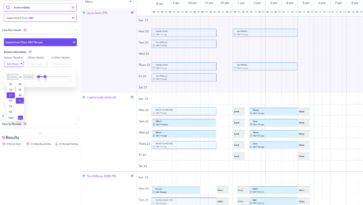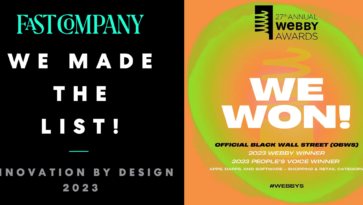 At Sidebench, we always strive to create inclusive, accessible, and impactful products. Therefore, partnering with the WITH Foundation–a nonprofit funder committed to promoting comprehensive healthcare for adults with developmental disabilities–for a two day symposium focused on universal design in tech products this fall was a logical decision for our team. Universal design can be defined as the design and composition of a technology so that it can be accessed, understood, and used to the greatest extent possible by all people regardless of their age, size, ability, or disabilities.
At Sidebench, we always strive to create inclusive, accessible, and impactful products. Therefore, partnering with the WITH Foundation–a nonprofit funder committed to promoting comprehensive healthcare for adults with developmental disabilities–for a two day symposium focused on universal design in tech products this fall was a logical decision for our team. Universal design can be defined as the design and composition of a technology so that it can be accessed, understood, and used to the greatest extent possible by all people regardless of their age, size, ability, or disabilities.
This is not the first time we’ve joined forces with the WITH Foundation to host an event advocating for universal design in digital products. In March 2018, we co-hosted a first-of-its-kind workshop, bringing technology designers, developers, and people with disabilities (PwD) together. Participants developed a great understanding of and appreciation for society’s role in the creation and elimination of social and physical barriers, as well as the socio-political model of disability. Building on the success of the first workshop, the second focused on design principles, the business case of universal design, and implementing user testing to assess products for universal design.
On November 27th, the WITH and Sidebench teams kicked off our second universal design symposium. The two-day event featured speakers, panels, and interactive exercises for designers, product managers, investors, and business professionals interested in learning about best practices for and benefits of universal design. Day 2 of the event was Beta Day–a day bringing individuals with developmental disabilities and developers with prototypes together to provide real-time feedback and user testing of various digital products.
Background
In working with the WITH Foundation, we aimed to address a problem common in product design: designing for the average. It makes sense, at first glance, to design for a “typical” user; however, designing for the average excludes a significant portion of the population from conversations during the design and prototyping stages. Nearly 1 billion people worldwide–40 million of whom reside in the United States and account for 18.7% of the American population–have at least one disability. Frequently, these individuals are left out of the user testing and research processes that precede product design and development.
Not only does designing for the average forego the experience of nearly 20% of the American population, it also fails to consider that designing for those on the ‘edge’ of society will greatly improve the experience for the average user. When technology addresses the needs of individuals with intellectual and developmental disabilities, it results in better technology for all.
Take curb cut outs, for example. Originally designed for individuals in wheelchairs, curb cutouts are also used by parents with strollers, people with shopping carts, bikers, and many more.
Or use the example of closed captioning. Originally designed for deaf individuals, it is easy to see how the on-screen text also benefits those in loud spaces, individuals who process information better through visual channels, or those temporarily struggling to hear due to sickness or injury. A study by Oregon State University surveyed over 2,000 hearing college students about the perceived benefits of closed captioning and found that almost all (98.6%) of students believed they benefited from closed captioning.
In either example above, the outcome is clear: the experience of the majority is significantly increased by designing without excluding minority.
The Workshop
With this goal in mind, we established the business case for and general understanding of universal design on Day 1. Speakers included Jutta Treviranus, Director of the Inclusive Design Research Centre (IDRC) and professor at OCAD University in Toronto, and Elle Waters, VP of Community and Global Development at Level Access. While most participants had some understanding of universal design, 100% of participants indicated that the first day of the workshop increased their understanding and positively impacted their view of universal design. The benefits of universal design were clear to everyone in the room; however, the challenge many participants face is in relaying the business case to management or team members.
With the help of our design business panel and a Q&A session with the audience, the business case was made clear: numerous businesses have thrived and excelled as a result of their ability to design for the edge–not only have they seen significant economic returns, but they have cultivated intense brand loyalty by PwDs, their loved ones, and allies The day ended with an engaging presentation by Sidebench UX designer, Cassy Gibson, discussing best practices for user testing, which segued perfectly into Day 2: Beta Day.
Beta Day was characterized by collaboration, empathetic listening, thoughtful critique, and active participation. Prototype testers with disabilities were situated around the room, allowing developers to move from table to table and all users were able to test each product. Testers with disabilities also received a stipend for their time and participation. Feedback from beta testers included a variety of comments, ranging from small changes to color to increase contrast and readability, to creating a new framework to incorporate blind users as well. One designer reflected on the benefit of getting a variety of perspectives from his non-traditional users: “I received a lot of constructive feedback, especially on small design decisions that I’d never notice.”
Comments
We are proud to partner with the WITH Foundation and bring attention to incorporating universal design in tomorrow’s tech products. At Sidebench, we continue to think broadly, commit to user research, and incorporate universal design into our products. We are excited to see the final products of our participants and are extremely grateful to our partners at the WITH Foundation, the attendees, and the beta testers who volunteered their time to make this event such a success.
Next Steps
We are excited to announce that we will be heading to SXSW 2019 for our Equitable Design for Persons with Disabilities Session with the WITH foundation this March! Going to SXSW? Make sure to connect with us and stop by our session. We can’t wait to share our learnings from the Universal design events with the SXSW community.









